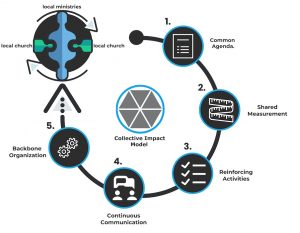
Churches of our region face a complex problem: no single church, denomination, key leader or organization can change the spiritual climate of South Florida alone. The lostness of our region is too great, the brokenness is too complex and the pain too deep for even the largest, most resourced churches, networks or denominations to tackle. And, perhaps it was meant to be this way. We need one another. We were designed to link arms — to view each other as essential co-laborers rather than in competition with one another. However without a model and framework for impact, our collaborative efforts could easily default to activities and photoshoots rather than outcomes designed to truly move the spiritual needle in our communities.
Church United and Collective Impact
Church United was built around Sanford University’s Collective Impact model. We believe this unique, but proven model best positions Church United for sustained gospel movement and Kingdom transformation. It provides a framework for our collaborative efforts that when paired with fervent prayer, may actually allow for a movement that lasts for generations to come.
According to the National Council of Non Profits, “Collective Impact describes an intentional way of working together and sharing information for the purpose of solving a complex problem. Proponents of collective impact believe that the approach is more likely to solve complex problems than if a single nonprofit were to approach the same problem(s) on its own. While collective impact seems very similar to plain old “collaboration,” there are certain characteristics that distinguish collective impact initiatives and make them successful.” For Church United, these characteristics are simple: a common agenda, a shared measurement system, reinforcing activities, continuous communication and a strategic backbone organization.

A common agenda
We are witnessing the largest and fastest numerical shift in religious affiliation in the history of our community. Pew, Barna and independent research all agree that even the most optimistic scenarios, Christian affiliation in the U.S. will shrink dramatically — with South Florida vastly outpacing other major metro areas.
Over 1 million youth who are currently in our churches today will choose to leave each year for the next 3 decades. 35 million youth raised in families that call themselves Christians will say they are not by 2050. The good news? God is uniting the Church around a common agenda here in South Florida and that agenda is simple: unity for the sake of mission — to stem the tide and present a united, evangelistic agenda of faith, hope and love.
A shared measurement system
Rather than asking what are we going to do, we ask what are we going to change. We are after outcomes, not outputs. We’ve aligned our efforts around Harvard’s 5 dimensions of human flourishing and measure the health of God’s people: spiritually, vocationally, relationally, financially and physically/mentally.
In a post-covid world, the need to measure beyond traditional measures of success like attendance and giving have become of paramount importance. Our measurement tool, powered by Barna and Gloo helps us know where people in our local churches are strong and uncovers opportunities for growth.
Reinforcing activities
According to Sanford, “Collective impact depends on a diverse group of stakeholders working together, not by requiring that all participants do the same thing, but by encouraging each participant to undertake the specific set of activities at which it excels in a way that supports and is coordinated with the actions of others.”
Church United cultivates a shared mission and commitment to be a part of the solution. We provide a strategy for gospel movement through our engagement framework of connect, collaborate and celebrate for the purposes of spreading faith, hope and love.
Constant communication
It’s been said that what you celebrate you replicate. We communicate and celebrate what churches do together not what they do alone. That celebration of “together” is really the celebration of trust and relationships that had been built over time. Pastors and church leaders need several years of regular meetings to build up enough experience with each other to recognize and appreciate the common motivation behind their different efforts. In short, they need to trust one another and actually like each other. They need time to see that their own interests will be treated fairly, and that decisions will be made on the basis of objective evidence and the best possible solution to the problem, not to favor the priorities of one church over another. We believe the only way to accomplish this is to invest in pastors emotional, relational, spiritual and mental health and prove that we want nothing from them, but rather something for them.
Strategic backbone organization
Church United has strategically aligned itself as part of the ecosystem of the National Christian Foundation of South Florida. This unique pairing ensures Church United’s neutrality and allows for the opportunity to leverage and deploy the generosity of local Kingdom minded donors and patrons with the influence, strength and connection of faith and work within the business community.
If you’re reading this and are curious about how to get your church involved in these efforts, we not only want to hear from you, we need you. Feel free to reach out to [email protected].
 Edwin Copeland serves as the Director of Church United with the National Christian Foundation of South Florida where he works to unify the Church through collaboration and celebration to see faith, hope, and love spread throughout South Florida. To learn more about Church United, visit churchunited.city
Edwin Copeland serves as the Director of Church United with the National Christian Foundation of South Florida where he works to unify the Church through collaboration and celebration to see faith, hope, and love spread throughout South Florida. To learn more about Church United, visit churchunited.city
Read more articles by Edwin Copeland at: goodnewsfl.org/author/edwincopeland/

Comments